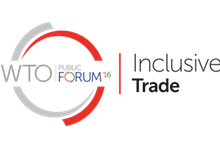Building the case of SDGs: What’s in for women engineers & scientists? A call to act!
28 Sep 2016 09:00h - 10:30h
Event report
[Read more session reports and live updates from the 2016 WTO Public Forum.]
This session, organised by the International Network of Women Engineers & Scientists, discussed concrete actions and plans towards inclusive trade for women, and presented solutions to address the digital gender gap, making an explicit connection to the sustainable development goals (SDGs). Panellists, all women who are active and successful in the field of science and engineering, shared their ideas for better inclusion of women in their professions.
The topic was introduced by Yvette Ramos, Member of the Board of Directors of the International Network of Women Engineers and Scientists (INWES) and President of Swiss Engineering. She presented the current state of women’s inclusion in science and innovation, such as their representation in national parliaments (the European average is about 25%), top academic decision-making positions, and engineering in Europe (European average is 16.6%). In short, there is enormous unused potential in science and innovation due to the lack of participation by women.
Next, the session’s moderator, Christian Ouedraogo of Expert Risk Management, embedded the issue of the inclusion of women in the framework of the SDGs. He emphasised the interconnection between the goals. According to Ouedraogo, the potential of women needs to be captured to achieve the SDGs.
Olga Cavalli, Member of the ISOC Board of Trustees and Academic Director of the South School on Internet Governance, explained the need for better inclusion of women in Internet governance institutions. Although these are considered modern organisations, women are insufficiently represented. She argued: ‘For real development, we need to include all of us in all organisations. Without that, we will never be developed and never achieve the SDGs.’ For her, the inclusion of women can best be stimulated by focusing on outreach, by sharing best practices, and by working on the idea of having quotas.
Next, Sangeeta Wij, Chair of WISE India (Women in Science and Engineering), emphasised the importance of having the right policies to encourage women, not only to access STEM professions (Science, Technology, Engineering, and Maths), but also for them to stay there and contribute to the sector. Unless women are represented at decision-making levels, ‘policies will always be one-sided.’ Wij also emphasised the need for women to always go for the top positions and not to be scared to get there.
Betty Bonnardel-Azzarelli, Vice-Chair of Women in Nuclear UK and Member of the Board of the Society of Satellite Professionals, shared the worrisome observation that, although there was an upward movement in female participation some time ago, this trend has plateaued and might even be reversing. Yet, for innovation to happen – including to achieve progress towards the SDGs – we need creativity, which depends on having diversity around the table.
Roseni Dearden, Member of the Board of INWES, shared Bonnardel-Azzarelli’s concern that women’s participation is decreasing in the field of engineering. She told of her training method to enable women without qualifications to access the field. She also emphasised the need for affordable, safe, and trusted Internet access to give women the opportunity to develop ICT platforms and applications.
Valerie Agberagba, Vice-President of the World Federation of Engineering Organizations and Chair of the Committee on Women in Engineering, highlighted three elements for more inclusive trade for women and scientists:
- Educate women on the possibilities of ICT.
- Provide funding for women with small businesses.
- Bring women together and encourage them to work together, instead of to compete.
Finally, Reine Essobmadje, Founder of Evolving Consulting, argued that in Africa, women are used to doing business, and e-commerce is giving women new opportunities. ICT is a key enabler for trade, but we need to include those who don’t yet have access to it, who are illiterate, or who don’t speak the language of the application.
The session ended with the signing of the ‘Geneva declaration at the WTO Public Forum 2016 by an international coalition of women engineers & scientists to realize action for a sustainable, technological and inclusive society.’
by Barbara Rosen Jacobson
Related event

